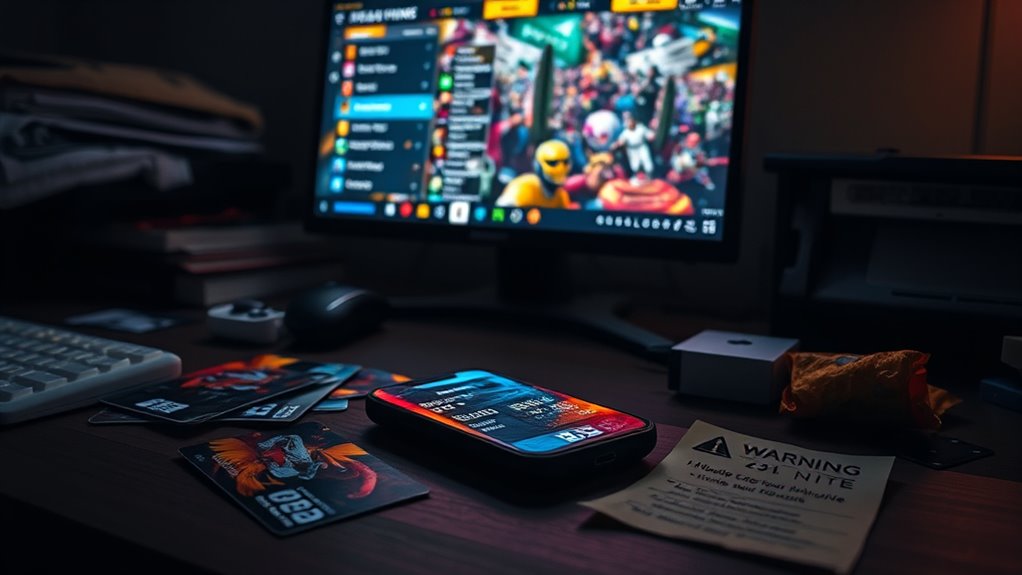Hidden costs in game modes can surprise you if you’re not careful. Microtransactions, loot boxes, and in-game upgrades often drain your wallet over time, sometimes without you realizing how much you’ve spent. Plus, many games share personal data or require subscriptions, which can pose safety risks. To stay safe, use strong passwords, review privacy settings, and be cautious with purchases. If you keep exploring, you’ll uncover tips to help you enjoy gaming without these hidden pitfalls.
Key Takeaways
- Microtransactions and loot boxes can unexpectedly drain funds; set spending limits to control expenses.
- Beware of in-game purchases that seem small but add up over time, leading to significant costs.
- Use parental controls and privacy settings to prevent unauthorized spending and protect personal data.
- Choose reputable games with transparent pricing and avoid games that heavily promote microtransactions.
- Stay informed about in-game costs and review your purchase history regularly to avoid hidden charges.
Online Security Risks in Multiplayer Modes

Multiplayer modes in online games often expose players to various security risks that can compromise personal information and device safety. One common threat is account theft, where hackers use weak passwords or stolen credentials to gain access to your gaming accounts. Once inside, they can steal personal data or even lock you out entirely. Phishing scams also pose a serious danger; attackers might send fake links or messages disguised as legitimate game alerts to trick you into revealing sensitive info. These scams can occur through in-game chat or external communication channels. To protect yourself, use strong, unique passwords, enable two-factor authentication, and stay cautious of suspicious messages. Additionally, understanding the vulnerabilities in online security can help you identify and mitigate potential threats. Being vigilant can help you avoid falling victim to these security risks and keep your gaming experience safe.
Hidden Costs of Microtransactions and In-Game Purchases

While many players focus on online security risks, it’s easy to overlook the hidden costs associated with microtransactions and in-game purchases. These can drain your wallet faster than you realize, especially when chasing in game currency or rare items. Imagine spending money on:
Microtransactions can quietly drain your wallet faster than expected.
- Loot boxes that promise excitement but often deliver nothing valuable
- Upgrades that seem small but add up over time
- Exclusive skins or weapons that tempt you to keep spending
Many games blur the line with loot box ethics, making it hard to see the true cost. You might think you’re just buying a cosmetic, but it can lead to a cycle of spending more than intended. Always consider the real value behind these purchases to avoid unnecessary financial pitfalls. Additionally, the rise of in-game subscription models can lead to ongoing expenses that are easy to overlook.
Mental Health Challenges From Excessive Gaming

Excessive gaming can substantially impact your mental health, leading to issues like anxiety, depression, and stress. You might develop emotional dependency on gaming as a way to escape real-life problems, which can worsen feelings of loneliness. Spending too much time immersed in games often results in social isolation, reducing your chances to connect meaningfully with others. This detachment can make you feel more disconnected from reality, intensifying mental health struggles. Over time, you may find it harder to balance gaming with daily responsibilities, increasing frustration and worry. Recognizing these signs early is vital. Limiting gaming time and seeking support can help prevent emotional dependency and social isolation from taking a serious toll on your mental well-being. Additionally, understanding the impact of automation in business can highlight how reliance on technology might influence your daily routines and mental health in modern life.
Privacy Concerns and Data Vulnerabilities

As you spend more time gaming, concerns about your privacy and data security become increasingly relevant. Game modes often collect sensitive information, risking exposure if not properly protected. Data vulnerabilities can lead to identity theft or unauthorized access to personal details. You might imagine:
- Hackers sneaking through weak data encryption,
- Your user anonymity compromised during multiplayer sessions,
- Personal data stored insecurely on servers vulnerable to breaches.
To safeguard yourself, guarantee game developers use robust data encryption methods and prioritize user anonymity. Always review privacy settings and be cautious about sharing personal information. Protecting your privacy isn’t just about avoiding spam; it’s about preventing serious data breaches that could impact you long-term. Stay vigilant, and don’t assume your data is safe by default. Environmental considerations in gaming, such as data server management, also play a role in privacy protection.
Strategies for Safer Gaming Experiences

To enjoy a safer gaming experience, you should adopt practical strategies that minimize risks and protect your personal information. Using parental controls helps restrict access to inappropriate content and limit screen time, especially if kids are involved. Enable these controls on gaming devices and platforms to monitor activity and set boundaries. Additionally, practice game moderation by choosing reputable games with secure servers and active moderation teams. This reduces exposure to harmful interactions, scams, or offensive content. Be cautious about sharing personal details online, and always review privacy settings to control who can contact you. Staying informed about game updates and community guidelines also helps you spot and avoid potential hazards, ensuring your gaming remains fun and safe. Recognizing the importance of content moderation can further protect you from harmful or inappropriate material.
Frequently Asked Questions
How Can Players Identify Hidden Costs in New Game Modes?
To spot hidden costs in new game modes, stay vigilant about game monetization tactics like microtransactions and energy systems. You should read reviews and community feedback to gauge potential expenses. Keep player awareness high by monitoring in-game prompts and understanding the fine print before making purchases. By staying informed and cautious, you can enjoy the game without falling victim to unexpected costs.
Are There Specific Signs of Mental Health Issues Caused by Gaming?
You might notice signs of mental health issues like gaming addiction or emotional distress when your thoughts are consumed by gaming, making it hard to focus on real life. You feel anxious or irritable if you can’t play, and your sleep or mood suffers. These signs are like dark clouds gathering; stay alert, set boundaries, and seek support if gaming begins to take over your well-being.
What Legal Protections Exist Against Data Breaches in Gaming Platforms?
You’re protected by legal protections like the General Data Protection Regulation (GDPR) and the California Consumer Privacy Act (CCPA), which require gaming platforms to safeguard your data. If a data breach occurs, these laws hold companies accountable and often give you rights to access or delete your information. Always read privacy policies and use strong passwords to help prevent breaches, but rest assured, legal protections aim to keep your data secure.
How Do Game Developers Implement Safety Features for Vulnerable Players?
You’re in safe hands when game developers implement safety features by focusing on user authentication to verify identities and prevent abuse. They also tweak game balance to protect vulnerable players from harassment or exploitation. Developers often include reporting tools and moderation systems to keep the environment welcoming. These measures act as a safety net, ensuring everyone can enjoy gaming without fear, proving that safety is a team effort.
Can Parental Controls Effectively Mitigate Hidden Costs and Safety Risks?
Yes, parental controls can effectively mitigate hidden costs and safety risks. By using parental oversight and control features, you actively monitor and restrict in-game purchases, chat access, and content exposure. This helps protect vulnerable players from unforeseen expenses and harmful interactions. Regularly reviewing and adjusting these controls guarantees they stay aligned with your child’s needs, creating a safer gaming environment and reducing potential hidden costs or safety hazards.
Conclusion
So, next time you plunge into that multiplayer game or splash out on in-game loot, remember—you’re not just risking a few bucks or a quick win. You might also be opening a virtual Pandora’s box of privacy leaks, mental stress, and security nightmares. But hey, who needs peace of mind when you can chase digital glory, right? Stay smart, stay safe, and maybe, just maybe, enjoy gaming without turning your life into a cautionary tale.









